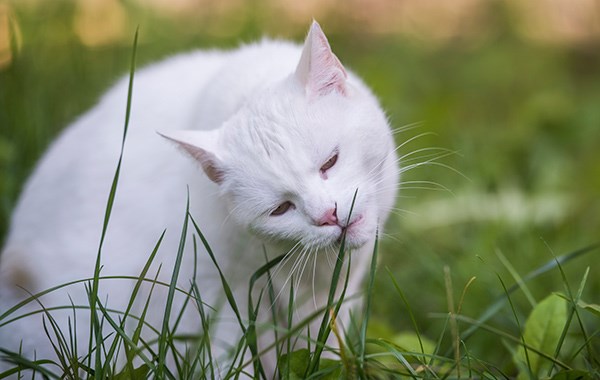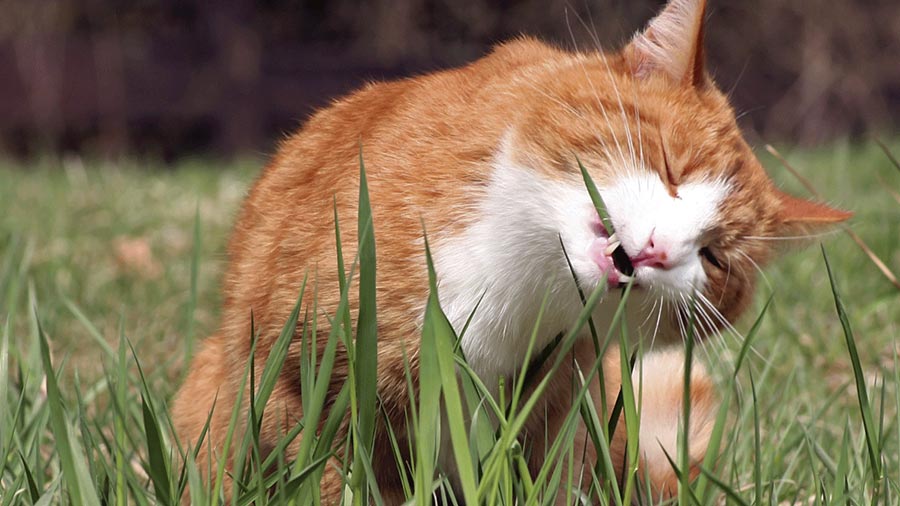Cats are carnivores. They are created to eat meat predominantly. Fruits, salads, carbs, and all that don’t mean much to them. So, when you see your sweet kitty nibbling or chewing on grass, it can be rather alarming. What does that mean? Is your cat sick and uses grass to feel better? Does he have worms and need the grass to help expel the parasites? Many parents are actually of the opinion that the grass-eating behavior implies an underlying issue in the GI tract. If you are a firm believer in this statement, stick around as we explore whether it is the truth or a big myth.
Parasitism in Cats
Before we get into all that, let’s talk about the issue of parasites in the feline world. According to Cornell Feline Health Center, Gastrointestinal (GI) parasitism is no strange condition in cats. The rate of prevalence can reach 45% in some populations. This means it is a common issue that can happen to any cat at any time. If your cat has ever had diarrhea, sore bottom, featured poor coat quality, or just lost his energy, chances are, he’s had a few worms in his belly.
Tapeworms and roundworms are particularly frequent. The latter affects 25-75% of cats with kittens suffering the most. They measure 3-5 inches long and come in a cream color. Roundworms exist in the small intestines and live off the cat’s food.
Worms can be picked up in a number of ways. The most common one is eating infected prey. While grooming, cats tend to also eat fleas found on their bodies and end up inviting parasites as well. Other causes include ingesting worms from fecal matter, being in contact with snails and slugs, and taking in larvae from breast milk.
The Relationship between Eating Grass and Worms
Dr. Hazel Carney, a feline behaviorist at WestVet, claims that there are plenty of reasons cats eat grass. There’s a possibility that the behavior can have a positive outcome for a cat with worms. Apparently, wild cats use grass as some parasiticidal agent. When grass gets to the guts, it wraps around the worms and triggers the cat’s system to purge it via the stool. That’s why you often find grass-covering worms in your cat’s stool after eating grass.
Some cats may also vomit the worms as well. This phenomenon used to take place among wild cats of the primeval world. Over time, the myth that “cats use grass to induce vomit” was developed. However, there’s no scientific backing for this theory. Dr. Hazel seems to think that the grass-eating habit is more of a habit than a vomit-inducing practice.
Other Reasons Cats Eat Grass

When you catch your kitty chewing on grass, don’t always conclude that he has parasites. There are so many other probable reasons for the behavior. These include:
- Fun: This is hard to believe but some cats find eating grass a fun exercise. For some strange reason, they derive a ton of pleasure from doing it. The body releases chemicals of pleasure and makes a cat happy. When your fur baby is bored and goes to the backyard to eat grass, don’t panic. Watch out for any symptoms of parasites. If you don’t find any, it’s probably because he just wants a fun activity to kill time.
- Unbalanced Diet: Cats that eat rabbits and birds often end up having grass in their systems. The ‘salad’ offers a ton of nutrition for the cat. It supplies folic acid and other vitamins that may be lacking in the cat’s diet. In this case, ensure that your fur baby has enough of everything to avoid this. Lucky for you, all-round feline healthy diets are everywhere.
- Instinct: As mentioned before, wild cats have been known to eat grass as a worm-removal tactic or any other reason. This has been passed down generations and has become a habitual practice. Think of it like a dog digging through holes and tunnels in the backyard (oh, cats do that at well). He sees all his friends and family members doing it.
Identifying the Problem
Now that you know your kitty can eat grass for varied reasons, how can you tell if he’s in danger or not? That is pretty easy actually. Watch out for parasite symptoms. These include poor coat quality, pet belly in kittens, diarrhea, weight loss, sore bottom, wheezing, coughing, loss of energy, and weakness. If you notice any of these symptoms, bring the cat to the vet as soon as possible. Else, check his diet. Increase his intake of vitamins and see if it changes. If he doesn’t, it just means he eats grass out of habit or for fun.
The Bottom line
Do cats eat grass when they have worms? It is possible. Grass can help them vomit out the worms or release them through the stool. On the other hand, don’t rule out the possibility of eating because of a nutritional deficiency or instinctively.

Hi! I am Eleanor Price. I started this website after my cat, Louie, almost died from a case of botulism (a type of food poisoning often caused by bacteria that grow on food items). Turned out that my cat’s diet was the problem. I have made it my duty to provide the best information and recommendations about everything cat lovers need to know about their felines’ health and wellbeing. My goal is to find the most informative content on anything feline-related and share it with fellow hardworking kitty lovers.

